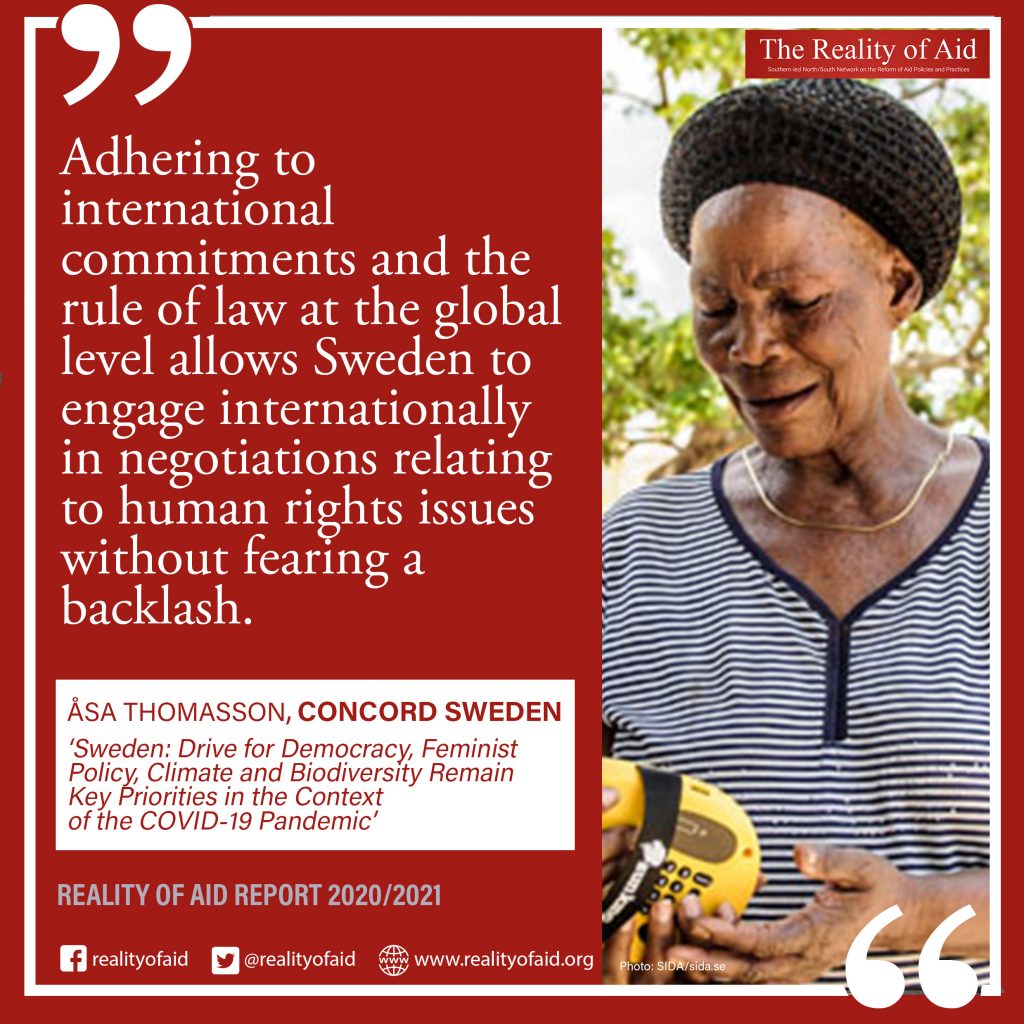CONCORD Sweden‘s Åsa Thomasson presents in detail the constructive role that Sweden continues to play as one of the global examples in observing international commitments to development cooperation, and the challenges that will shape its policy in the coming future.

SWEDEN: DRIVE FOR DEMOCRACY, FEMINIST POLICY, CLIMATE AND BIODIVERSITY REMAIN KEY PRIORITIES IN THE CONTEXT OF THE COVID-19 PANDEMIC
Åsa Thomasson, CONCORD Sweden
In 2020, the Swedish Government proposal on the implementation of Agenda 2030, domestically and globally, was adopted by parliament. In this proposal Sweden reconfirmed its commitment to policy coherence for development. The Leave No One Behind principle was emphasized as the guiding principle for all of Sweden’s 2030 Agenda implementation efforts.
CSOs recognize that Sweden has played a constructive role in the realization of many of the global goals and continue to do so. However, several issues need attention as identified in a recent review of Sweden’s policies for global development; this includes a lack of coherency and contradictions regarding certain development issues. Some examples would be the country’s arms exports to the conflict in Yemen and resistance to EU legislation to promote tax transparency of multinational corporations, amongst others.
Sweden has a longstanding target of providing 1% of GNI in ODA and continues to live up to this commitment. As an international donor, Sweden has received positive remarks for being a principled and long-term development partner. It is known for having relatively flexible funding modalities and a high proportion of core funding for multilateral organisations.
Five years ago, Sweden rapidly expanded its counting of in-donor refugee costs (even more than the admittedly high number of refugees received) and used high shares of its ODA budget for domestic costs for in-donor-country reception of refugees from low- and middle-income countries. This initiated a trend followed by other large donors in the EU.
Since the EU has essentially closed its borders and few people seeking asylum are able to reach Sweden, the amount of in-donor refugee costs reported as ODA are down to lower levels again. These lower levels are also because of the limited mobility for people during the pandemic. The current political debate in Sweden on ODA has been influenced by the highly politicized debate on migration and development in the EU.
In an international comparison, a few things stand out in Sweden’s development cooperation:
- A high proportion of Sweden’s multilateral aid (60% of total ODA) includes considerable support to UN institutions in the form of core funding,
- A higher-than-average support for democracy, human rights, gender equality and the rule of law; and
- A strong result against the OECD DAC Gender Markers: in 2018, 83% of Swedish aid had gender equality as a principal or significant objective.
- Sweden has a slightly higher percentage of support to civil society than the DAC average.
Sweden’s definition of additional climate finance is close to the one advocated by many in civil society in the global climate negotiations. Climate finance includes an emphasis on grants not loans, and levels above the traditional 0.7 ODA target.
The Government has prioritized the fulfilment of commitment to transparency in development assistance and to ensure that the reporting of its development assistance on openaid.se is further developed. Swedish aid delivered through UN agencies, other international institutions, and the Multilateral Development Banks continues to make up the majority of its funding for 2021.
In December 2021, Sweden adopted its new strategy for humanitarian aid and was well-received by CSOs. However, there were some criticisms regarding partner decisions by the Swedish International Development Agency (SIDA). Like many other donors, Sweden has recently increased its support for private sector development and the mobilisation of private investments.
Swedish aid will continue to be defined by COVID-19 and its consequences. In 2020, a considerable amount of aid was redistributed to new interventions addressing this crisis. Also, many existing development programs implemented by Sida’s existing long-term partners have had to change focus to deal with the demands resulting from the pandemic.
Going forward, the challenges for Swedish development cooperation are quite political in nature. In negotiations with other donors at the EU level and in OECD DAC, Sweden is often perceived as a principled donor that is reluctant to let national security and other domestic interests shape its development policy. Adhering to international commitments and the rule of law at the global level allows Sweden to engage internationally in negotiations relating to human rights issues without fearing a backlash.
The current Swedish government is facing an uncertain political situation ahead. National elections are coming up in 2022, potentially having a bigger impact on Swedish aid than in the past. Since 2006 the Swedish parliament has had a majority consensus on providing one per cent on GNI in development assistance. In mid-2019, the Moderate Party, one of the larger opposition parties, abandoned this commitment and campaigned to reduce the aid budget by a third. In remains to be seen if these changing political dynamics will have a negative impact on Sweden’s ODA in the coming years.
This is an excerpt from a chapter in the RoA Report 2020/2021.
